Iran Taking Revenge On Dissent By Executions: Amnesty International
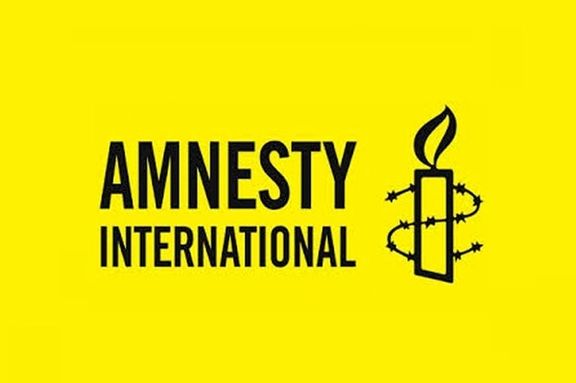
Amnesty International says the Iranian regime is executing individuals to spread fear and take revenge on protesters who stand up against the Islamic Republic.

Amnesty International says the Iranian regime is executing individuals to spread fear and take revenge on protesters who stand up against the Islamic Republic.
Responding to the Iranian authorities’ public execution of Majidreza Rahnavard, Diana Eltahawy, Amnesty International’s Deputy Director for the Middle East and North Africa, said Monday “the horrific public execution…exposes Iran’s judiciary for what it is: a tool of repression sending individuals to the gallows to spread fear and exacting revenge on protesters daring to stand up to the status quo.”
The Islamic Republic hanged a second protester, Majidreza Rahnavard in less than a week in public on Monday after charging him with the alleged killing two members of security forces.
Eltahawy further added that the arbitrary execution of the youth “lays bare the extent of the Iranian authorities’ assault on the right to life and their disregard for even maintaining a façade of meaningful judicial proceedings.”
Amnesty urged the international community to take all necessary measures to pressure the Iranian authorities to stop executions and annule death sentences.
The body has identified 20 people at risk of execution in connection with the protests among them 11 sentenced to death.
Three individuals, according to Amnesty, have undergone trials on capital charges and are either at risk of being sentenced to death or may have already been sentenced to death, with no publicly available information on their status.
Six others may be awaiting or undergoing trial on charges carrying the death penalty, stated the international human rights organization.

Several members of the German parliament (Bundestag) are politically sponsoring Iranian political prisoners most of whom are in danger of imminent execution on bogus charges.
Ye-One Rhie, a member of the Bundestag who has undertaken political sponsorship of imprisoned dissident rapper Toomaj Salehi said in a series of tweets Monday that she has written this to the Iranian ambassador, the EU special representative for human rights, the council of Europe commissioner for human rights, and the high commissioner for human rights about Toomaj’s case and expressed her great concerns for his well-being.
The 32-year-old rapper who was violently arrested in late October and currently in detention in Dastgerd Prison is awaiting a verdict which many fear could be a death sentence for “corruption on earth”. In her tweets, Rhie underlined that the authorities have deprived Toomaj of any contact with the lawyer he and his family wish to represent him. His lawyer, Amir Raesian, says he has not been allowed access to the case files yet.
The number of German MPs taking political sponsorship of Iranian protesters is growing. Carmen Wegge has declared herself the sponsor of Armita Abbasi, a young woman of 20, who was missing since her arrest on October 10 before being taken to a hospital in Karaj on October 18 by security forces with multiple injuries including internal bleeding and evidence of repeated rape.
Political patronage or sponsorship (politische patenshaften in German) is a way for German parliamentarians to select a specific political prisoner and use their political weight to campaign for the prisoner’s freedom. This is mainly done by addressing the ambassador and the relevant government and international institutions dealing with human rights.
“It is the special responsibility of politicians to make the human rights situation around the world an issue – not just in their own. The violation of human rights must not be accepted anywhere, because all people are free and born with equal rights,” the International Society for Human Rights (ISHR) recently quoted Iran's Nobel Peace Laureate Shirin Ebadi as saying who added that politicians in other countries should actively raise human rights issues in bilateral talks with the Iranian government.
Clara Anne Bünger, founder and board member of Equal Rights Beyond Borders, a Greek-German human rights organization enforcing the rights of refugees and asylum seekers in Greece, Germany, and throughout the EU, has taken on the political sponsorship of the 22-year-old Mohammad Ghobadlou who has been sentenced to death on the charge of “corruption on earth” by the notorious Revolutionary Court judge Abolghasem Salavati.
In a video message circulated on social media two weeks ago, Ghobadlou’s mother called for help for her son before it was too late. She said the court refused to allow his defense lawyer to attend the secret trial. “They sentence him to death in the first session of the court,” she said.
“The EU must ensure that judges like him never find a safe place in the EU,” Bünger said in a tweet.
Salavati and other judges of the Revolutionary Court are famous for harsh sentencing including many death sentences in high-profile trials of political figures and activists, journalists and others over the years and lack of due process in these cases.
Judge Salavati who has recently sentenced Ghobadlou and at least five other protesters to death was sanctioned by the European Union in 2011 and by the US Treasury Department in 2019 for human rights abuses.
Two other Bundestag representatives, Lukas Benner, and Maryam Blumental, have also jointly undertaken to politically sponsor Mahan Sadrat (spelled incorrectly as Sedarat in some sources). The 22-year-old who has been convicted of “waging war against God” in a sham trial and sentenced to death is at imminent risk of execution. Mahan denied being in possession of a knife in court which the prosecutor claims he used to “cause an environment of insecurity and fear” to the people.
Another young man, Mohammad-Mehdi Karami, is being sponsored by Helge Limburg. “The regime in Iran assumes that he was involved in a killing. In truth he should die because he stands up for democracy and human rights. His execution would be a judicial killing,” Limburg tweeted Monday.
Mostafa Nili, a well-known lawyer who has represented many activists, prisoners of conscience and protesters in the past is being sponsored by Norbert Röttgen. Nili was arrested on November 7 by the Revolutionary Guards (IRGC) Intelligence Organization (SAS) along with Hassan Younesi, another human rights lawyer.
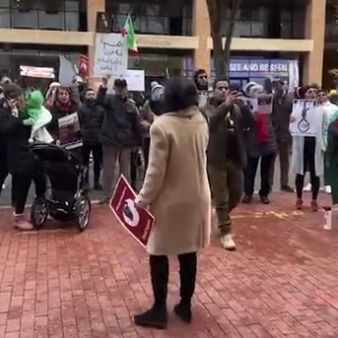
Iranians abroad have held rallies in various cities around the world in protest to the execution of young dissidents in their home country.
A group gathered in front of the Interests Section of the Islamic Republic in Washington DC Monday, to show anger at the hanging of protesters. They chanted “Death to Khamenei”, and “Death to the whole Establishment”.
At the same time, a number of Iranians living in Seattle held a rally in support of the nationwide uprising against the Islamic Republic.
In Germany demonstrators assembled in front of the Embassy of the Islamic Republic in Berlin to express anger at the clerical rulers for the execution of Majidreza Rahnavard, a second protester to be hanged in less than a week in public on Monday allegedly for killing two government security agents.
Mohsen Shekari was the first protester hanged on December 8. The 23-year-old protester was only accused by the judiciary of blocking a street and injuring a Basij militia.
A similar event was also held in Budapest, Hungary in front of Iran’s embassy to slam the brutality of authoritarian rulers.
On the other hand, a rally is scheduled to be held in Spain in front of the Embassy of the Islamic Republic in Madrid to protest the arrest of a Spanish citizen in Iran.
London, Stockholm, Los Angeles, Sidney, Chicago, Aarhus were the other cities witnessing anti-government protests by Iranian diaspora.
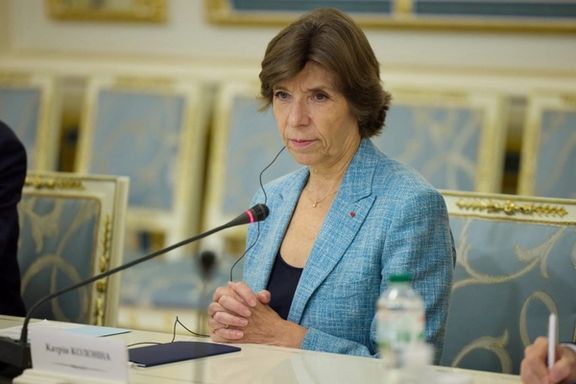
France's foreign minister says Iran’s charge d’affaires has been summoned over the supply of weapons to Russia used in Ukraine and crackdown on protesters.
Catherine Colonna told Reuters that the Iranian diplomat was also questioned over the treatment of seven French nationals who are currently in custody in Iran.
France’s foreign ministry on Monday also condemned the public execution of an Iranian who was sentenced to death following his participation in the protests currently under way in Iran.
The Islamic Republic hanged a second protester, Majidreza Rahnavard in less than a week in public on Monday after charging him with killing two members of security forces.
In a statement the Ministry of Europe and Foreign Affairs of France stated, “this execution, the second in less than a week, comes in addition to the many other serious, unacceptable violations of fundamental rights and freedoms committed by the Iranian authorities.”
The statement also added that demonstrators must not be executed in response to the current protests in Iran, stressing France calls on Iranian authorities to halt these executions and to listen to the legitimate aspirations of the Iranian people.
Meanwhile, Foreign Secretary of the United Kingdom said Tuesday that Iran and Russia's sordid deals threaten global security.
James Cleverly said in a tweet that “We are holding their desperate alliance to account.”
He also noted that London has just sanctioned high-level Russian and Iranian figures in response to the “abhorrent strikes against civilian targets.”
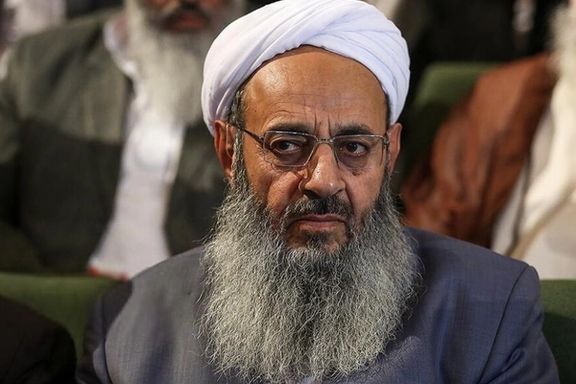
Leading Iranian Sunni cleric Mowlavi Abdolhamid has once again warned about the consequences of executions and suppression of protesters in Iran.
In a tweet on Monday, Abdolhamid, the religious leader of Iran’s largely Sunni Baluch population, asked the authorities of the Islamic Republic to listen to the voice of the protesters.
His comments came after the Iranian regime hanged a second protester, Majidreza Rahnavard in less than a week in public on Monday after charging him with killing two members of security forces.
“Arbitrary executions and repression have no result other than God’s displeasure, public hatred, and igniting the nation’s anger,” reads his tweet.
He further asked the government to “see the facts and hear the voice of the people.”
During his trial, Majidreza Rahnavard was denied the right to choose a lawyer, and his execution was carried out only 23 days after his arrest, which has raised many questions about the trial process and judicial justice.
Abdolhamid had previously said in reaction to the execution of Mohsen Shekari, who was the first protester hanged by the regime December 8, “it is not correct from the viewpoint of the Quran and Sharia to execute a person who did not kill anyone and only blocked the road and used a knife.”
Mohsen Shekari, the 23-year-old protester was only accused by the judiciary of blocking a street and injuring a Basij militia.
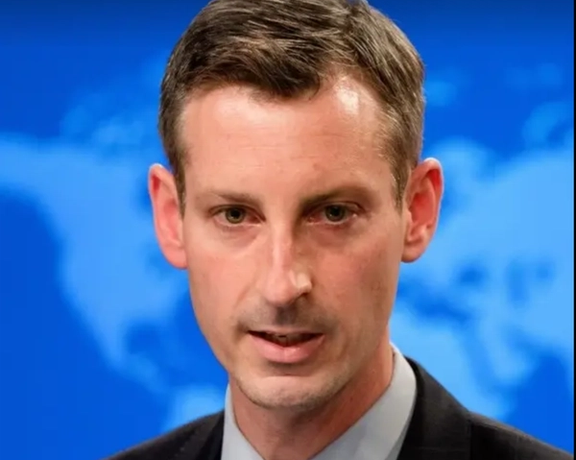
The United States has slammed Iran for hanging a protester in public, saying the regime’s use of harsh sentencing and public execution is meant to intimidate the people.
State Department spokesperson Ned Price told a briefing on Monday that “we denounce this draconian treatment in the strongest terms. These harsh sentences and now the first public execution...are meant to intimidate Iran's people. They're meant to suppress dissent. And they simply just underscore how much Iran’s leadership fears its own people.”
The Islamic Republic hanged a second protester, Majidreza Rahnavard in less than a week in public on Monday after charging him with killing two members of security forces.
Majidreza Rahnavard is the Islamic Republic’s latest victim, said Ned Price, adding that he was swiftly executed after what can only be described as a sham trial.
“We understand that he was also executed publicly; he was hanged in public. The regime has rounded up and detained thousands of people for their involvement in these protests. Many of them now face harsh sentences, including the death penalty and sham trials that lack any due process,” Price went on to say.
He reiterated that the US used its human rights authorities to hold accountable those who are responsible for this brutal crackdown.
Washington has imposed some sanctions for Tehran’s human rights violations since September, but still says it is ready for diplomacy over Iran’s nuclear program.